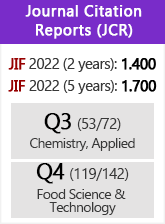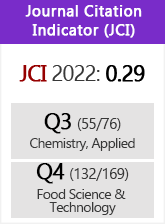A new mathematical model for the viscosity of vegetable oils based on freely sliding molecules
DOI:
https://doi.org/10.3989/gya.0824182Keywords:
Density, Model, Temperature, Vegetable oil, ViscosityAbstract
Viscosity is one of the most important parameters for vegetable oil. A new mathematical viscosity model was developed based on freely sliding molecules with Lennard-Jones’ potential and linear density-temperature relation. According to the functions derived from the new model, viscosity gradually decreases with temperature at atmospheric pressure. Viscosity increases with density, however, due to the molecular momentum transfer and statistical effect of average molecular potential. After the temperature dependent function is fitted to the 417 experimental data points collected from references and distributed among the ranges: 278.15–453.15 K and 2.6-192.6 mPa.s, it was found that the calculated data agreed well with experimental data with R2 ≥ 0.961 for 13 oil samples. The density dependent function was also satisfactorily fitted to the 143 viscosity data points versus density from 5 oil samples with R2 ≥ 0.917.
Downloads
References
Belgharza M, Hassanain I, Lakrari K, Moudane ME, Satrallah A, Azzouzi EHE, Azzouzi ME, Elmakhoukhi F, Elazzouzi H, Elimache A, Belghiti MAE. 2014. Kinematic Viscosity Versus Temperature for Vegetable Oils: Argan, Avocado and Olive. Australian Journal of Basic App. Sci. 8, 342-345.
Diamante LM, Lan T. 2014. Absolute Viscosities of Vegetable Oils at Different Temperatures and Shear Rate Range of 64.5 to 4835 s?1. J. Food Process. 234583, 1-6. https://doi.org/10.1155/2014/234583
Esteban B, Riba JR, Baquero G, Rius A, Puig R. 2012. Temperature dependence of density and viscosity of vegetable oils. Biomass and Bioenergy 42, 164-171. https://doi.org/10.1016/j.biombioe.2012.03.007
Fasina OO, Colley Z. 2008. Viscosity and Specific Heat of Vegetable Oils as a Function of Temperature: 35 °C to 180 °C. International Journal of Food Properties 11, 738-746. https://doi.org/10.1080/10942910701586273
Fasina OO, Hallman H, Craig-Schmidt M, Clements C. 2006. Predicting Temperature-Dependence Viscosity of Vegetable Oils from Fatty Acid Composition. J. Am. Oil Chem. Soc. 83, 899-903. https://doi.org/10.1007/s11746-006-5044-8
Fulcher GS. 1925. Analysis of recent measurements of the viscosity of glasses. J. Am. Ceramic Soc. 8, 789-794. https://doi.org/10.1111/j.1151-2916.1925.tb18582.x
Gupta A, Sharma SK, Toor AP. 2007. An empirical correlation in predicting the viscosity of refined vegetable oils. Indian J. Chem. Technol. 14, 642-645.
Lennard-Jones JE. 1924. On the Determination of Molecular Fields. Proceedings of the Royal Society of London 106, 463-477. https://doi.org/10.1098/rspa.1924.0082
Mawatari T, Fukuda R, Mori H, Mia S, Ohno N. 2013. High Pressure Rheol. Environmentally Friendly Vegetable Oils. Tribology Letters 51, 273-280. https://doi.org/10.1007/s11249-013-0180-4
McNutt J, He Q. 2016. Development of biolubricants from vegetable oils via chemical modification. J. Ind. Eng. Chem. 36, 1-12. https://doi.org/10.1016/j.jiec.2016.02.008
Noureddini H, Teoh BC, Clements LD. 1992. Viscosities of Vegetable Oils and Fatty Acids. J. Am. Oil Chem. Soc. 69, 1189-1191. https://doi.org/10.1007/BF02637678
Rodenbush CM, Hsieh FH, Viswanath DS. 1999. Density and Viscosity of Vegetable Oils. J. Am. Oil Chem. Soc. 76, 1415-1419. https://doi.org/10.1007/s11746-999-0177-1
Simion AI, Grigoras CG, Gavril? LG. 2014. Mathematical modelling of ten vegetable oils thermophysical properties. Study of density and viscosity. Annals Food Sci. Technol. 15, 371-386.
Stanciu I. 2011. Modeling the temperature dependence of dynamic viscosity for rapeseed oil. J. Sci. Arts 1, 55-58.
Stanciu I. 2012. A new viscosity-temperature relationship for vegetable oil. J. Petroleum Technol. Alternative Fuels 3, 19-23. https://doi.org/10.5897/JPTAF12.001
Tammann G, Hesse W. 1926. Die Abhangigkeit der Viskositat von der Temperatur bei unterkuhltenflussigkeiten (The dependence of the viscosity on temperature for super-cooled liquids). Zeitsch. Anorg. Allg. Chem. 156, 245-257. https://doi.org/10.1002/zaac.19261560121
Valantina SR, Susan D, Bavasri S, Priyadarshini V, Saraswathi RR, Suriya M. 2016. Experimental investigation of electro-rheological properties of modeled vegetable oils. J. Food Sci. Technol. 53, 1328-1337. https://doi.org/10.1007/s13197-015-2050-6 PMid:27162414 PMCid:PMC4837714
Vogel H. 1921. Das Temperaturabhangigkeitgesetz der Viskositat von Flussigkeiten (The law of the relationship between viscosity of liquids and the temperature). Physikalische Zeitschrift 22, 645-646.
Yang XH, Li W. 2015. A novel theoretical approach to the temperature-viscosity relation for fluidic fuels. Fuel 153, 85-89. https://doi.org/10.1016/j.fuel.2015.02.115
Yang XH, Zhu WL. 2016. A new model for the viscosity of liquid short chain (C1-C4) 1-alcohols over density and temperature based on Lennard-Jones potential. J. Mol. Liquids 224, 234-239. https://doi.org/10.1016/j.molliq.2016.09.117
Published
How to Cite
Issue
Section
License
Copyright (c) 2019 Consejo Superior de Investigaciones Científicas (CSIC)

This work is licensed under a Creative Commons Attribution 4.0 International License.
© CSIC. Manuscripts published in both the printed and online versions of this Journal are the property of Consejo Superior de Investigaciones Científicas, and quoting this source is a requirement for any partial or full reproduction.All contents of this electronic edition, except where otherwise noted, are distributed under a “Creative Commons Attribution 4.0 International” (CC BY 4.0) License. You may read here the basic information and the legal text of the license. The indication of the CC BY 4.0 License must be expressly stated in this way when necessary.
Self-archiving in repositories, personal webpages or similar, of any version other than the published by the Editor, is not allowed.
















